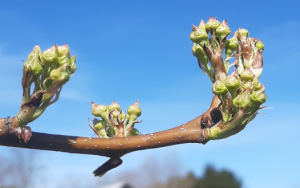Tree Fruit Newsletter — April 29, 2024

Highmoor Bud Stages
McIntosh apples – late half-inch green
Honeycrisp apples – quarter-inch green
Sweet cherries – green tip
Peaches – Green calyx and red calyx, depending on variety
Pears – budburst and green cluster, depending on variety
Promalin® for Frost Protection
Promalin applied within 24 hours after a freeze can increase apple fruit set when the seed cavity has been damaged. If you miss this time window, it may still work up to five days after. We just don’t know for certain because of the limited research on this technique. From pink through early fruit set is the window of effectiveness.
It will not improve fruit set when the entire flower has been damaged, but will induce seedless fruit set when the outer flower, or part of the blossom that grows into the fruit, survives. Because peaches, plums and cherries have a different flower structure, Promalin will not help improve fruit set after a freeze. Promalin is a combination of two plant growth regulators that most likely mimic the signal of seeds.
For more info, visit this website posted by Univ. of Vermont Extension and by Valent: Use of Promalin on frost-affected fruit buds – UVM Fruit Blog
New Chemical Thinner Labeled for Stone Fruit
Valent has labeled Accede®, a hormone-based thinner, for use on peach and plum. It works by stimulating ethylene in the tree, so follow product instructions to prevent negative side effects. It can thin blossoms when applied from pink to petal fall, but it is recommended to apply it when the stage is 50% to 100% open blossoms. Accede is not labeled for use on peaches after petal fall.
Current research shows that follow up hand thinning can be expected when flower numbers are high. Accede will reduce the crop load so that less hand thinning is needed later on in summer. If using Accede for the first time in your orchard, I suggest the low rate to gauge how well it works on your trees. Maine is not the ideal climate for peaches, so trees may still have some lingering weakness from winter 2023.
Accede is also labeled for thinning apples, but works best when fruitlets are 15 to 25 mm in diameter. This timing does not coincide with peach thinning, but it can be applied to apples at the full bloom stage.
Accede is the precursor to ethylene, a naturally occurring plant hormone that functions in leaf, flower and fruit abscission or drop. High heat will intensify response to Accede, so use it when temperatures are below 85 °F.
For more information, here are links to articles about research trials:
Studies Show Accede PGR Excels at Thinning Even After Freezes – Growing Produce
Peach-thinning potential – Fruit & Vegetable MagazineFruit & Vegetable Magazine (fruitandveggie.com)
A link to John Cline’s presentation from the winter webinar series here: https://youtu.be/cFzlRG6yb7c
Prohexadione-CA for Bitter Pit Reduction
Pro-Ca (Apogee®, Kudos®) is normally used to inhibit shoot growth, but can reduce bitter pit incidence in Honeycrisp when applied at the Pink stage of bloom. But, when it’s applied after this stage, it can increase bitter pit. This growth regulator is not normally used on Honeycrisp because of its low vigor, but may useful for orchards that have more than 12 inches of average shoot length and where fireblight has been severe. Use caution when using it for bitter pit reduction because the timing from pink to bloom can quickly progress. Here is a link to the research summary: Donahue-Pages-23-28-from-NYFQ-BOOK-Fall-2018-8-29-18-4.pdf (nyshs.org)
Renae Moran
UMaine Cooperative Extension Tree Fruits Program
University of Maine Cooperative Extension
PO Box 179
Monmouth, ME 04259
(207) 933-2100
rmoran@maine.edu
Mention of a trademark, proprietary product, or vendor does not constitute a guarantee or warranty of the product, nor does it imply approval or disapproval to the exclusion of other products or vendors that may also be suitable.
In complying with the letter and spirit of applicable laws and pursuing its own goals of diversity, the University of Maine System does not discriminate on the grounds of race, color, religion, sex, sexual orientation, transgender status, gender, gender identity or expression, ethnicity, national origin, citizenship status, familial status, ancestry, age, disability physical or mental, genetic information, or veterans or military status in employment, education, and all other programs and activities. The University provides reasonable accommodations to qualified individuals with disabilities upon request. The following person has been designated to handle inquiries regarding non-discrimination policies: Director of Equal Opportunity, 5713 Chadbourne Hall, Room 412, University of Maine, Orono, ME 04469-5713, 207.581.1226, TTY 711 (Maine Relay System).
